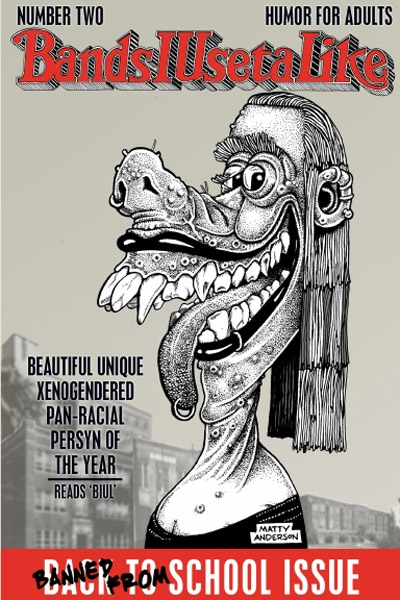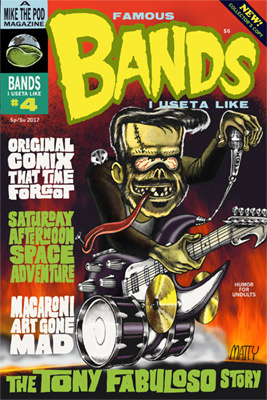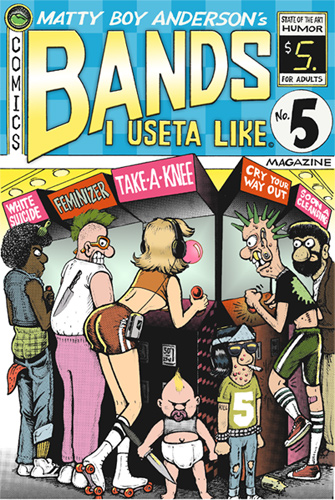The world is tough on young people, especially when there are forces trying to control them, often by coddling them. Every awkward feeling teenagers have is commoditized and acknowledged, no matter how insignificant. Their bad moods are notated with special emoticons. Their hormonal bullshit is all validated as worthy expression.
Coincidentally, almost everything sucks.
I make an effort to be unprejudiced about millennials, I really do. I refuse to become the stereotype of the old man screaming at the kids to get off his proverbial lawn. But you have to understand the frustration. 20 years ago, I had to argue with people my age who claimed Quentin Tarantino was God. Now I’m dealing with the children of those people.
I’ve encountered black people who proudly watch nothing but BET (granted, that was in jail). There are whites who only watch FOX News, and Hispanic people who watch nothing but Telemundo. America “embraced diversity” by compartmentalizing its separatism. Everyone gets their information and entertainment from one place now, and no one is very interesting. Unless you go off-line, and let’s get real, you’d never do that. You can’t.
The Simpsons is still on the air, after over a quarter-century, and the capricious nature of the young ensures that it will come to be seen as outdated. This is the way of all things. But The Simpsons is an historic program, one with few contemporary equals if any, and you oughta give credit where it’s due. Even if you’re an earbud-sporting teenage dullard.
This analysis is based upon the first 25 seasons of The Simpsons, as I have not seen the last few. I don’t have a television, because they became prohibitively expensive as part of a limp anti-recession stimulus a few years ago. I don’t hate high-definition to be ironic; I hate it because it makes art and human beings look like dry dogshit.
Here are some things about The Simpsons that the kids of today might not grok. KIDS!
1. EVERYONE IS YELLOW ON PURPOSE
The Simpsons bowed in 1989, after a successful run of shorts on The Tracey Ullman Show. To set the show apart from existing cartoons, the creators made all the non-black people yellow. This has the advantage of creating “aesthetic distance”; the people are not quite human, so their misfortunes are more exaggerated (and easier to laugh at). In the day-glo 90s, it fit like a power glove.
Before the 1980s, cartoon lovers were not pedants. No one questioned how Yosemite Sam survived explosions unscathed. They were cartoons. Our parents yelled at us to go outside and play if we watched them for too long. Your parents turned on a network of cartoons all day to shut you up. We came to see cartoons as extraneous; you came to see them as a babysitter. That’s why you shoot up schools and we didn’t. You don’t even grasp the parameters of basic reality. You’ve allowed television and the government to raise you and decide what’s right for you. This is partly your parents’ fault, as they were being run amok by the government when you were born. You don’t even know there’s a choice.
In the past decade of The Simpsons, no ancillary character has been spared a spotlight, even if they were created as a one-time joke. This is an exploitation of people who believe inanimate objects have feelings. That’s why over a dozen episodes of Futurama center on Fry and Leela’s relationship, which no well-adjusted viewer cares about. Those of us born before the 1990s don’t give a sideways shit if cartoons fuck. If that’s what you care about, nobody fucks you in reality. Straight up.
2. THE KIDS LOVE VIOLENT CARTOONS
Bart and Lisa Simpson’s favorite show is Itchy & Scratchy, a cat-and-mouse team inspired by “Tom & Jerry”. That was a series of short subjects where the titular animals (and oftentimes a dog) would try to violently murder each other, which people my age grew up watching. We also watched cartoons where a wily coyote would utilize his “super-genius” to attempt to kill a roadrunner. Bugs Bunny was considered noble because he was gay, but he kept it out of your face, until you crossed him; then watch out. A duck named Daffy was blasted in the beak with a shotgun, and we laughed until tears rolled from our eyes.
The cartoons you grew up on came from one network and were carefully vetted to be mollifying and not at all thought-provoking. They took the economic aspects from the old cartoons we loved and stripped away all the dark anarchy. You’re programmed to find violence so abhorrent, it even “triggers” you in cartoons. That’s not sensitivity. That’s weakness. That’s why hostages lie down and die.
The world is a tough place, and people hit each other. Folks die for no reason. That was the entire point of making light of it in cartoons. That’s why it was so funny. You’ll never see someone casually die in the street; the creators of Looney Tunes saw that shit and worse. They didn’t retreat to a “safe space”; they used their talents to turn darkness into light.
And so, that’s why the Simpson kids laugh at those inappropriately bloody cartoons; because they’re hilarious. If you fear violence, it rules you. If you laugh at it, it can never be your master.
3. THE PRANK CALL TRADITION
At many points during the series, Bart Simpson does something that is no longer possible- he dials up the local bartender, and gets him to call out a joke name to everyone in attendance. When the bartender realizes he’s being played, he growls threats into the phone. On the other end, Bart is rolling on the floor, laughing.
The names that Bart uses (I. P. Freely, Amanda Huggenkiss) are funny enough on their own, harking back to the old substitute-teacher-roll-call gag. There is a motherlode of these names in The National Lampoon High School Yearbook Parody, the equal of which I have never seen. This is another fading tradition; styling a really clever pun in the guise of a name.
Moe Syzslak, Springfield’s bartender, is based on the surliest man ever to sling suds. Like the Technoviking, the world is only aware of him because of surreptitious surveillance.
In the mid-1970s, two young men—John Elmo and Jim Davidson; later known collectively as Bum Bar Bastards, or The BBB—began calling the Tube Bar located at Journal Square in Jersey City, New Jersey. The bar was owned by heavyweight boxer Louis “Red” Deutsch, and most of the time Deutsch himself answered the calls. During a call, the pranksters would ask Deutsch to call out fictitious, pun-like/homophone names such as “Pepe Roni” (pepperoni), “Hal Ja-Like-a-Kick” (how’d you like a kick), “Phil My-Pockets” (fill my pockets), “Al Coholic” (alcoholic) or “Mike Hunt” (my cunt). Most of the time, Deutsch would call out the names, unaware that he was subjected to a prank.
At times Deutsch would catch on, and when he did, he would respond with extreme hostility, shouting profanity, obscene sexual references (usually involving the caller’s mother), and threats of physical harm at the caller. He would utter threats such as, “I’m gonna break dem bones in your feet, so you’ll never be able to walk right again!” as well as “I’ll cut your belly open and show you all the black stuff you got in there!” Sometimes Red would offer the two pranksters a reward of $100 or $500 if they would show up at his bar in person, but they never took him up on the offer.
By the 1980s dubbed cassette tapes of the calls, unofficially referred to as the Red Tapes or Tube Bar Tapes, were shared between staff of several major league sports teams such as the New York Mets, Los Angeles Dodgers and Miami Dolphins. The popularity of these prank calls spread throughout respective sports leagues, branching out to sports reporters and then into the larger media world. [Wikipedia]
Behind all great humor is abuse. If you examine a joke deeply enough, you often find attitudes that are incongruous with modern society. That’s why all the gags in Deadpool are abstract references to Star Wars. No one in the youngest generation is well-read, or shares common points of reference with their peers. Star Wars and Deadpool are movies you see because everyone else did, not based on their own merits.
That’s why hurtful memes are funny, and Penny Arcade is not. Meanwhile, the old prank calls endure in popularity, since making new ones is illegal. Safe humor never sticks. People always return to the source of that naughty laugh, secretly if they must. There is no acceptable imitation.
“Humor can be dissected, as a frog can, but the thing dies in the process.” –E.B. White
4. THE CHANGING OPENER WAS A BIG DEAL
Typically, every episode begins with Bart writing a phrase on the school chalkboard hundreds of times, as a punishment. Many people my age suffered such a task, and last century, the opening credits of a sitcom were as unchanging as the Rock of Ages. In the 1990s, several animated TV shows made little changes to their openers, to hold viewers’ attention through the credits.
I’ll put it to you this way, regarding the reticence to even minor changes; in one of the first Simpsons episodes, Waylon Smithers was black. The producers contacted Klasky-Csupo, at the time the show’s animators, and asked them to fix the mistake. “No… no,” replied the Hungarian version of Family Guy‘s Consuela, a secretary at the future Rugrats studio.
Bob’s Burgers, a show you likely enjoy, makes minor changes like it’s no big deal. Back when everything was ink and paint, it most certainly was.
The second (and more significant) change that comes almost every week is the “Couch Gag”, where the entire Simpson family gathers on the couch to watch TV. What was once a fun little trifle became a bloated obligation, and the last few seasons have even featured guest animators and pastiches of other cartoons, like Rick & Morty. This is all a desperate exercise to keep new viewers from changing the channel before the show begins. To be fair, that’s all it ever was.
5. THE “NUCLEAR FAMILY”
When The Simpsons first ran, it was competing with The Cosby Show, comedian Bill Cosby’s long-running family sitcom, on Thursday nights at 8. Whereas The Simpsons presented an American family in all its imperfections, the Cosbys were a paragon of moral fortitude and goodness. As for how things worked out, you’ve probably read about Bill Cosby in the papers recently.
Ha! Who am I kidding? You don’t read newspapers! You get all your news from Facebook, where it can be easily bought, censored or faked.
Once upon a time, the American family consisted of a mom, a dad, a daughter, a son, and a baby. It was a post-WWII signal that meant everything’s okay, the human comedy is perpetuating. It wasn’t something that was resented or vilified; it was the desired goal.
I come from a family that was torn apart by tragic events. When you hurt inside, you reflexively lash out at those you believe have more than you do. Generation after generation has been raised in homes broken by divorce. Candice Bergen’s dull dramedy Murphy Brown got a jolt in ratings when Dan Quayle criticized her status as a single parent. Too bad he didn’t criticize the cloying falseness of an actress holding a baby and crooning “You Make Me Feel Like A Natural Woman”. Then again, you’re probably already looking up Candice Bergen, because you have no idea who I’m talking about. Dan Quayle too.
My point is, little by little, the wrong things were validated, for ratings. Personally, I have no plans to breed; that doesn’t mean I disparage those who do (unless they’re stupid about it). People willfully cluster online, according to the pettiest of grievances. That can be a very destructive paradigm. Having a family is not, unless you’re breeding a personal army, and regardless of any opinions you or I might have, the rest of the world is already getting on with it. As I joked in my Crumb comic, maintaining a negative attitude about family will not get you very far in this life.
It took a few seasons for the writers to really “get” middle child Lisa Simpson. She was a very specific sister archetype; intelligent yet shy, noble until wronged. Bart and Lisa, both voiced by absurdly gifted women, have created as realistic a fraternal relationship as any live-action family, past or present. For the past fifteen years, the kids have been used to parody whatever trend the script requires, which is not what made the show great.

Originally, another TV show would only be referenced because it was familiar to viewers. Now it’s because of a promotion. No Simpsons fan ever gave a fuck about American Idol.
It’s what happens when people write for things they grew up consuming.
It’s why everything sucks now, and why you should appreciate things that don’t, like The Simpsons.
(Most of it.)

















You must be logged in to post a comment.